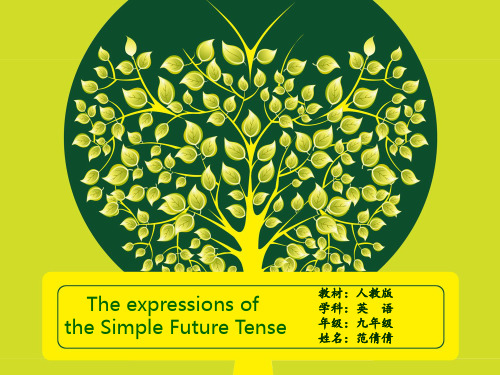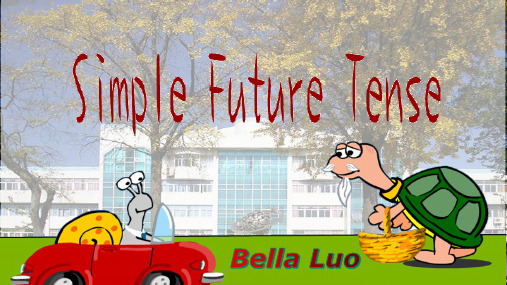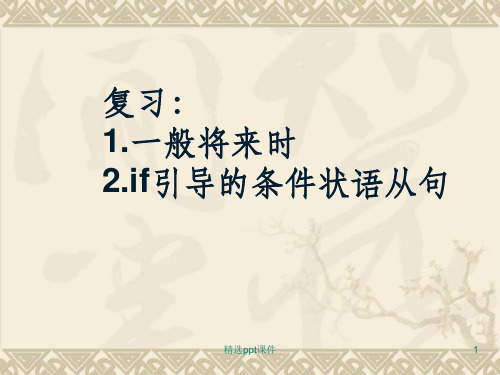2015届中考英语专题复习---一般将来时复习课件
合集下载
一般将来时复习课件

特殊疑问句
特殊疑问句是在疑问词后加上一般将来时的谓语和宾语,例如,"When will you finish your project?"(你什么时候会完成你的项目?)
05
一般将来时与现在进行时 的区别
表示未来的计划和安排的区别
将来时
用于表示未来的计划和安排,强调动作或事件在未来的某个时间点发生。
表示意愿和打算
总结词
一般将来时可以用来表示个人的意愿和打算,通常与表示意愿的动词连用,如 “want”、“intend”等。
详细描述
在英语中,一般将来时常常用于表达个人的意愿和打算,例如“I want to travel next year”表示明年想去旅行。这个时态也可以用于描述某个人的计划或目标,例如“He
We _____ (not let) our dog run in the street.
She _____ (be) a doctor when she grows up.
翻译题练习
翻译题1: 请将下列中文句子 翻译成英文。
明天我要去公园。 (I will go to the park tomorrow.)
详细描述
一般将来时是英语语法中的一种时态,用来表示在将来某个 时间点之前将要发生的动作或存在的状态。这个时态常用于 表达预测、计划或意愿,强调动作或状态尚未发生,但即将 在未来某个时间发生。
结构
要点一
总结词
一般将来时的基本结构是“will + 动词原形”。
要点二
详细描述
一般将来时的结构相对简单,主要由助动词“will”加上动 词的原形构成。例如,“I will go to the park tomorrow”表示“我明天将会去公园”。需要注意的是 ,在一般将来时中,动词的形式不会发生改变,仍保持其 基本形式。此外,一般将来时也可以通过其他形式来表达 ,如“be going to”结构,但“will + 动词原形”是最常 见的表达方式。
特殊疑问句是在疑问词后加上一般将来时的谓语和宾语,例如,"When will you finish your project?"(你什么时候会完成你的项目?)
05
一般将来时与现在进行时 的区别
表示未来的计划和安排的区别
将来时
用于表示未来的计划和安排,强调动作或事件在未来的某个时间点发生。
表示意愿和打算
总结词
一般将来时可以用来表示个人的意愿和打算,通常与表示意愿的动词连用,如 “want”、“intend”等。
详细描述
在英语中,一般将来时常常用于表达个人的意愿和打算,例如“I want to travel next year”表示明年想去旅行。这个时态也可以用于描述某个人的计划或目标,例如“He
We _____ (not let) our dog run in the street.
She _____ (be) a doctor when she grows up.
翻译题练习
翻译题1: 请将下列中文句子 翻译成英文。
明天我要去公园。 (I will go to the park tomorrow.)
详细描述
一般将来时是英语语法中的一种时态,用来表示在将来某个 时间点之前将要发生的动作或存在的状态。这个时态常用于 表达预测、计划或意愿,强调动作或状态尚未发生,但即将 在未来某个时间发生。
结构
要点一
总结词
一般将来时的基本结构是“will + 动词原形”。
要点二
详细描述
一般将来时的结构相对简单,主要由助动词“will”加上动 词的原形构成。例如,“I will go to the park tomorrow”表示“我明天将会去公园”。需要注意的是 ,在一般将来时中,动词的形式不会发生改变,仍保持其 基本形式。此外,一般将来时也可以通过其他形式来表达 ,如“be going to”结构,但“will + 动词原形”是最常 见的表达方式。
一般将来时课件(PPT)

2. be going to+do可表示事先计划的意图,而 will 则表示说话人当时决定的意图;
We're going to drive you home after the meeting. Don't call a taxi. We'll drive you home.
I feel ill now, and I'll go to see the doctor. I'm going to see the some meat in the fridge soon. (变一般疑问句) W __i_ll he _f_in_d _a_n_y_ meat in the fridge?
3.She will stay there in a week. (对划线部分提问) __H_o_w _s_o_on_ w_i_ll__ she _s_t_a_y_ there?
①
②
③
① Who will have an English party next week ?
② What will they have next week ?
③ When will they have an English party?
2. be going to 表将来
will 和be going to 的区别
school late. Tomorrow he _w_il_l _get (get) up very early, so he _w_o_n’t be (not be) late for school tomorrow.
1.Lucy will do her homework at home soon. (改否定句) Lucy _w_o_n’_t_d_o_ her homework at home soon.
一般将来时(21张PPT)初中英语专项复习课件(2)

I hope it will be warm tomorrow. (主观意愿) 我希望明天会暖和起来。
【典例1】My sister wants a new dress. She ____ it
to the party.
A. wears
B. is going to wear
C. wore
D. has worn
考查动词的时态。句意:我妹妹想要一条新裙子。她想 派对上穿。由My sister wants a new dress可知动作还未执 行,故用be going to形式,表示有计划做某事。
【典例2】He ________ her a beautiful hat on her next
birthday.
【典例3】 —Which team do you think ______ the game? —Hard to say. There are still ten minutes before it ends. A. won B. has won C. will win D. wins
考查动词的时态。句意:—你认为哪个队会赢这场 比赛?—不好说。还有十分钟才结束。根据句意判 断为一般将来时,选用will+动词原形。
volleyball match.
A. will watching B. watches
C. is watching
D. are going to watch
考查动词的时态。句意:后天,他们将看一场排球 赛。The day after tomorrow为一般将来时标志词, 选用将来时结构be going to do,故答案选D。
【典例2】There __________ a meeting tomorrow
【典例1】My sister wants a new dress. She ____ it
to the party.
A. wears
B. is going to wear
C. wore
D. has worn
考查动词的时态。句意:我妹妹想要一条新裙子。她想 派对上穿。由My sister wants a new dress可知动作还未执 行,故用be going to形式,表示有计划做某事。
【典例2】He ________ her a beautiful hat on her next
birthday.
【典例3】 —Which team do you think ______ the game? —Hard to say. There are still ten minutes before it ends. A. won B. has won C. will win D. wins
考查动词的时态。句意:—你认为哪个队会赢这场 比赛?—不好说。还有十分钟才结束。根据句意判 断为一般将来时,选用will+动词原形。
volleyball match.
A. will watching B. watches
C. is watching
D. are going to watch
考查动词的时态。句意:后天,他们将看一场排球 赛。The day after tomorrow为一般将来时标志词, 选用将来时结构be going to do,故答案选D。
【典例2】There __________ a meeting tomorrow
中考英语语法复习课件一般将来时

一场英语考试。
否定句:主语 + be动词+ not +going to+动原+其它. • Look at the sunshine. There is not going to be rain. 看那阳光
,这将不会下雨。 • They aren't going to have an English test next week.他们下周
Tomorrow. 明天。
一般将来时态的结构: 第2类:be going to + 动原 肯定句:主语 + be动词 + going to + 动原+其它. • He is going to spend his holidays in London. 他打算在伦敦度
假。 • They are going to have an English test next week.他们下周有
英语考试吗?
特殊疑问句:特殊疑问词+ be动词 + 主语 +going to+动原+其 它? • What are you going to do tomorrow?明天你打算作什么? • What are they going to do next week?他们下周将去做什么?
一般将来时态的结构: 第3类:现在进行时表将来 (1)come, go, arrive, leave, start, begin, return等瞬时位移动词 的一般现在时可以表示将来含义,主要用来表示在时间上已确 定或安排好的事情。这类情况主要用于表示按照计划或安排将 要发生的动作或事件,常表示最近或较近的将来,有“意图”、“ 安排”或“打算”,常用肯定句,如come,go, leave等。 • The train leaves at six tomorrow morning. 火车明天上午六点
否定句:主语 + be动词+ not +going to+动原+其它. • Look at the sunshine. There is not going to be rain. 看那阳光
,这将不会下雨。 • They aren't going to have an English test next week.他们下周
Tomorrow. 明天。
一般将来时态的结构: 第2类:be going to + 动原 肯定句:主语 + be动词 + going to + 动原+其它. • He is going to spend his holidays in London. 他打算在伦敦度
假。 • They are going to have an English test next week.他们下周有
英语考试吗?
特殊疑问句:特殊疑问词+ be动词 + 主语 +going to+动原+其 它? • What are you going to do tomorrow?明天你打算作什么? • What are they going to do next week?他们下周将去做什么?
一般将来时态的结构: 第3类:现在进行时表将来 (1)come, go, arrive, leave, start, begin, return等瞬时位移动词 的一般现在时可以表示将来含义,主要用来表示在时间上已确 定或安排好的事情。这类情况主要用于表示按照计划或安排将 要发生的动作或事件,常表示最近或较近的将来,有“意图”、“ 安排”或“打算”,常用肯定句,如come,go, leave等。 • The train leaves at six tomorrow morning. 火车明天上午六点
一般将来时PPT课件(PPT18张)

(肯)——Yes, there is/are. (否)——No, there is/are not.
e.g.
① Th翻er译e :is g下oi周ng这to里b将e 会a s有po一rt个s m运e动et会ing。next week.( (肯定式)
② There isn’t going to be a sports meeting next week (否定式) ③ ——Is there going to be a sports meeting next week?(一般疑问式)
be going to be + done (表示按计划或安排发生的被动动作)
be about to
(指将要发生的事情)
be.tgo. be + done (表示按计划或安排发生的被动动作)
1. The bridge will be finished
next month. (finish)
2. The problem is going to be discussed at the meeting.(be going to,discuss) 3. The sports meet is to be held on Oct. 运动会将于10月5日举行
4. do sth表将来 一般现在时表将来,主要用于时间状语从句和条件状语从句中,或者用来表示 按照时刻表的规定将要发生的事情。如: I’ll tell him about it as soon as I see him.我一见到他就告诉他这事儿。 My plane takes off at seven tomorrow morning. 我的飞机明天早上7点起飞。
A. are having B. are going to have C. will having D. is going to have
e.g.
① Th翻er译e :is g下oi周ng这to里b将e 会a s有po一rt个s m运e动et会ing。next week.( (肯定式)
② There isn’t going to be a sports meeting next week (否定式) ③ ——Is there going to be a sports meeting next week?(一般疑问式)
be going to be + done (表示按计划或安排发生的被动动作)
be about to
(指将要发生的事情)
be.tgo. be + done (表示按计划或安排发生的被动动作)
1. The bridge will be finished
next month. (finish)
2. The problem is going to be discussed at the meeting.(be going to,discuss) 3. The sports meet is to be held on Oct. 运动会将于10月5日举行
4. do sth表将来 一般现在时表将来,主要用于时间状语从句和条件状语从句中,或者用来表示 按照时刻表的规定将要发生的事情。如: I’ll tell him about it as soon as I see him.我一见到他就告诉他这事儿。 My plane takes off at seven tomorrow morning. 我的飞机明天早上7点起飞。
A. are having B. are going to have C. will having D. is going to have
中考英语语法专项复习课件一般将来时

一般将来时讲解及练习
1
时态使用 情况
2
时态句子结 构
3
4
真题演练与实 总结
践
1 1
一般将来时的使用情况
1. 将来某一个时间将要发生的动作(主语计划、打算去做某事)
I
have some bread
tomorrow morning
1 1
一般将来时的使用情况:
2. 将来某个时间段存在的状态: be going to +V. /will+V.
_a_r_r_iv_e_s_
(
arrive)
in
2 句子结构(be going to+V.)
: 主语+be going to+ eg: I am going to
+其他. TV this afternoon.
: 主语+be +not going to+ eg: She is not going to
II. 结构:will +动词原形 (缩: ’ll )
注: 如果主语是I /we , 可用shall+动词的原形 We will/shall build a new bridge in the town next year. I will/shall study harder from now on.
There be的将来时:
(1)There will be … There will____ a match on the playground tomorrow.
在操场上明天将进行一场比赛
(2)There is/are going to be …
_______ _____ _____ ____ ____ a party at the school hall tomorrow afternoon.
1
时态使用 情况
2
时态句子结 构
3
4
真题演练与实 总结
践
1 1
一般将来时的使用情况
1. 将来某一个时间将要发生的动作(主语计划、打算去做某事)
I
have some bread
tomorrow morning
1 1
一般将来时的使用情况:
2. 将来某个时间段存在的状态: be going to +V. /will+V.
_a_r_r_iv_e_s_
(
arrive)
in
2 句子结构(be going to+V.)
: 主语+be going to+ eg: I am going to
+其他. TV this afternoon.
: 主语+be +not going to+ eg: She is not going to
II. 结构:will +动词原形 (缩: ’ll )
注: 如果主语是I /we , 可用shall+动词的原形 We will/shall build a new bridge in the town next year. I will/shall study harder from now on.
There be的将来时:
(1)There will be … There will____ a match on the playground tomorrow.
在操场上明天将进行一场比赛
(2)There is/are going to be …
_______ _____ _____ ____ ____ a party at the school hall tomorrow afternoon.
2015届中考英语专题复习---一般将来时复习课件

be going to与will的异同(3) (5)表“询问对方是否愿意”或表“客气 的邀请”时,常用will。 A. Will you lend me the book ? 你能 把那本书借给我吗? B. Will you go there with us ? 你能和 我们一起去那儿吗?
be going to与will的异同(3)
shall用于第一人称, will可以通用于各种
be going to与will的异同 (1)
(1)be going to与will都可表示即将发生的 事情。前者多用于口语,后者常用于书 面语和正式文告中。 A. There’ll (=is going to) be a football match in our school next week . 下周我校将举行(有)一场足 球赛。 B. The American basketball team will arrive in Beijing tomorrow . 美 国篮球队明天将抵达北京。
1. I am going to join the school rowing club. (改 为一般疑问句并作肯定回答) Are going to _____ you ______ ______join the school rowing club? Yes, __ I ____. am 2. He goes cycling every day. (用tomorrow morning改写句子) He _____ _______ ______ is going ______ to go cycling tomorrow morning. 3. They are going to play soccer because it makes them strong. (对画线部分提问) Why _____ are _____ they going to play soccer? _____ __________
一般将来时(28张PPT)初中英语专项复习课件

v.欣赏,享受
No8.invite
v.邀请
turn系列
turn/on/off/up/down
“到达”系列 arrive in/at get to/reach
1.定义
一般将来时
将要发生的动作或者状态
➢ Demi will be 18 years old. ➢ It's cloudy.It is going to rain.
有will提will
有be提be
小结
一般将来时
一般将来时 6.特殊考点
there be句型与将来时
there will be there is/going to be
现在进行时表将来
come; go; arrive; leave; fly; land
• YOUR LOGO
附:一般将来时考点 思维导图
练一练
Is your isn't
going to visit
口诀2:有 be 提 be
练一练
B
练一练
D
There be与一般将来时
There be 句型 There is a party.
➢ sb. be going to do
There is going to be a party tomorrow.
汇报人:稻壳儿
练习
C B
A
THANK YOU
有be提be
5.句型转换
一般将来时
Demi will eat cakes tomorrow.
否定句: Demi will not eat cakes tomorrow.
=won’t 一般疑问句: Will Demi eat cakes tomorrow? 回答: 肯定回答:Yes, She will. 否定回答:No,She won't. 特殊疑问句:
2015届中考英语复习课件_第8课时Units7—8(共22张PPT)

自学反馈 重点突破
句 型 再 现
第8课时┃Units 7—8
句 型 再 现
10.然后加入卷心菜、西红柿和洋葱,再煮上10分钟。 Then, add the cabbage, tomatoes and onion and cook for another 10 minutes ________________________________. 11.你知道如何种树吗? how to plant a tree Do you know ___________________________________? 12.现在,到了享受米线的时候了! it's time to enjoy Now, ____________________________ the rice noodles!
第8课时 Units 7—8
第8课时┃Units 7—8
ห้องสมุดไป่ตู้
自 学 反 馈
类别 课标考点要求 pollution .peace→(形容词) ________ peaceful 1.pollute→(名词) ________2 3.inside→(反义词) ________ outside 4.celebrate→(名词) ________ celebration 5.possible→(反义词)impossible ________6.hole→(同音词) ______ whole traveler 7.travel→(名词)旅行者________ 词汇 full 8.fill→(形容词) ________ 拓展 pepper 9.paper→(形近词)甜椒________ 10.salt→(形容词) ________ salty 11.traditional→(名词) ________ tradition 12.believe→(形容词) ________→( believable 形容词的反义词) unbelievable __________
句 型 再 现
第8课时┃Units 7—8
句 型 再 现
10.然后加入卷心菜、西红柿和洋葱,再煮上10分钟。 Then, add the cabbage, tomatoes and onion and cook for another 10 minutes ________________________________. 11.你知道如何种树吗? how to plant a tree Do you know ___________________________________? 12.现在,到了享受米线的时候了! it's time to enjoy Now, ____________________________ the rice noodles!
第8课时 Units 7—8
第8课时┃Units 7—8
ห้องสมุดไป่ตู้
自 学 反 馈
类别 课标考点要求 pollution .peace→(形容词) ________ peaceful 1.pollute→(名词) ________2 3.inside→(反义词) ________ outside 4.celebrate→(名词) ________ celebration 5.possible→(反义词)impossible ________6.hole→(同音词) ______ whole traveler 7.travel→(名词)旅行者________ 词汇 full 8.fill→(形容词) ________ 拓展 pepper 9.paper→(形近词)甜椒________ 10.salt→(形容词) ________ salty 11.traditional→(名词) ________ tradition 12.believe→(形容词) ________→( believable 形容词的反义词) unbelievable __________
复习一般将来时ppt课件

What will your精d选rppet课a件m school have ?
8
一般将来时:be going to +动词原形 肯定句:主语+_b_e__g_o_in_g__to__+_动__词__原__形__+其他
否定句:主语+be +_n_o_t_ +going to+动词原形+其他
一般疑问句:_B_e_+主语+going to+动词原形+其他
时态--主将从现 主情从现 主祈从现
精选ppt课件
28
Revision
if条件状语从句结构及时态
1. 如果主句是一般将来时,从句则用一般现在时。
If it rains(从句), I will stay at home. I’ll go with you if you don’t want to go alone(从句).
精选ppt课件
21
Adverbial Clause of Condition if 引导的条件状语从句
精选ppt课件
22
If you are happy, what will you do?
If I am happy, I will smile.
精选ppt课件
23
If you become sad, what will you do?
Be going to+动词原形
精选ppt课件
7
一般将来时:will + 动词原形
“主谓(宾)句型”的一般将来时: 肯定句:主语+ _w_i_ll +_动__词__原__形_+(宾语)+其他
一般现在时、一般过去时和一般将来时课件(PPT31张)

A. When did B. What time will C. When are D. What time are
8. ---Let’s go to the cinema. There is a good movie.
---Ok. I _A____ you at the school gate at 7 p.m.
1. Long long ago, there ___C_____ four foxes and they lived a happy life together. A. had B. has C. were D. are 2. Could you tell me __C______ a moment ago? A. what were they talking about B. what are they talking about C. what they were talking about D. what they are talking about
e. g. She is going to buy a new bike.
她打算买一辆新的自行车。
1. We will land soon. 2. They will not take off next week. 3. Will he be ready tomorrow? Yes, he will. / No, he won’t.
3. With the development of science and technology, robot cooks __C_______ in our
families in the future.
A. appear
B. appeared
C. will appear D. were appearing
8. ---Let’s go to the cinema. There is a good movie.
---Ok. I _A____ you at the school gate at 7 p.m.
1. Long long ago, there ___C_____ four foxes and they lived a happy life together. A. had B. has C. were D. are 2. Could you tell me __C______ a moment ago? A. what were they talking about B. what are they talking about C. what they were talking about D. what they are talking about
e. g. She is going to buy a new bike.
她打算买一辆新的自行车。
1. We will land soon. 2. They will not take off next week. 3. Will he be ready tomorrow? Yes, he will. / No, he won’t.
3. With the development of science and technology, robot cooks __C_______ in our
families in the future.
A. appear
B. appeared
C. will appear D. were appearing
复习一般将来时 ppt课件

+ 动词原形
• 否定句:
• 主语 + will not + w动ill词n原ot形=won’t
• 一般疑问句:
• Will + 主语 +动词原形?
• 特殊疑问句:
• W、H开头特殊疑问词 +一般疑问句?
• 肯定/否定回答: Yes,主语+will. /No,主语+will
not.
10
复习一般将来时
12
复习一般将来时
一.用所给动词的适当形式填空
1.I don't think that it ______ ( rain ) tomorrow. 2.The students _________ ( clean ) their classroom this evening. 3.She ________ ( go ) to the cinema with her classmates the day after tomorrow. 4.There _________ ( be ) a meeting next Monday. 5.They _______ ( have ) an Engllish evening next week. 6.It _________ ( take) him half an hour to finish his homework soon.
year , in two days, This Friday, This summer等 • In the future, one day, someday, from now on,
soon,tonight,when引导的时间状语从句,in 2030……
8
复习一般将来时
一般将来时(24张PPT)初中英语专项复习课件

11.what _____ they _______( do ) tomorrow ? 12.The boy _______( not have ) an English lesson tomorrow . 13.________ you _______( learn ) Chinese next week ? 14.I ________ ( arrive ) there tomorrow . 15.Mike _________ ( not watch ) a movie tomorrow .
( ) 10. If they come, we ________ a meeting.
A. have
B. will have C. had
D. would have
( ) 11. He ________ her a beautiful hat on her next birthday.
A. gives
I _________ (milk) cows.
Key:1 will visit 2 will go 3 will…do, will milk
归纳
重点一
Will和be going to 的区别
重点二
Shall的用法
shall用于第一人称,表示将要,相当于will。 例如:We shall take a walking. 特殊: shall用于第二、第三人称,则含有命令、警告、允诺或威胁的语气。 例如: He shall do the dishes before he plays video games.(命令的意味较浓。)
A. will be; is
B. is; is
C. will be; will be
D. is; will be
中考英语 一般将来时课件 (共41张PPT)

_H_o_w_ _s_o_o_n__w_i_llshe _s_t_a_y_ there?
I will = I’ll They will = They’ll
He will = He’ll she will = she’ll We will = we’ll You will= you’ll
It will= it’ll Will not = won’t
①
②
③
① Who will have an English party next week ?
② What will they do next week ?
③ When will they have an English party?
知识检测
1.Julia will do her homework at home soon. (改否定句)
一般将来时态
(The Simple Future tense)
Short play 短剧
It Will Be Beauty’s Birthday Tomorrow!
明天是美羊羊的生日
第一篇章 礼物
Chapter 1 Gifts
我打算给她……I am going to _____________________ (练习应用一般将来时的 be going to 句型)
the party
1.There ____C______ a meeting tomorrow
afternoon. A. will be going to B. will
be 随主语有am is are 变化
1. 肯定句: 主语 + be going to + V原型
2. I am going to fly kites the day after tomorrow.
I will = I’ll They will = They’ll
He will = He’ll she will = she’ll We will = we’ll You will= you’ll
It will= it’ll Will not = won’t
①
②
③
① Who will have an English party next week ?
② What will they do next week ?
③ When will they have an English party?
知识检测
1.Julia will do her homework at home soon. (改否定句)
一般将来时态
(The Simple Future tense)
Short play 短剧
It Will Be Beauty’s Birthday Tomorrow!
明天是美羊羊的生日
第一篇章 礼物
Chapter 1 Gifts
我打算给她……I am going to _____________________ (练习应用一般将来时的 be going to 句型)
the party
1.There ____C______ a meeting tomorrow
afternoon. A. will be going to B. will
be 随主语有am is are 变化
1. 肯定句: 主语 + be going to + V原型
2. I am going to fly kites the day after tomorrow.
人教版英语中考复习:一般将来时 (共24张PPT)

练一练
一、填空。 1. 我打算明天和朋友去野炊。 I ________ _______ _________ have a picnic with my friends. 2. 下个星期一你打算去干嘛? 我想去打篮球。 What ________ ________ _________ _________ _________ next Monday? I _______ ________ _______ play basketball. 3. 你妈妈这个周末去购物吗?是,她要去买一些水果。 ________ your mother _______ ________ go shopping this ___________? Yes, she _________. She ______ ________ __________ buy some fruit. 4. 你们打算什么时候见面。 What time _______ you _________ __________ meet?
Part III 一般将来时
2.主语+will/shall+do+..... (1).I shall/will go to Beijing next month.(I will=I'll) 下个月我将要去北京. (2).You will come to see me tomorrow.(you will=you'll) 明天你将要来看我. (3).She will read English tomorrow morning.(She will=She'll) 明天早上她将要读英语.
• 挡道 • 用这种方法(方式) • 在值日 • 关上 • 脱下;起飞 • 顺便说一下 • 付清 • 在…尽头
中考英语总复习备考-语法突破-一般将来时专项复习(共19张PPT)

4)will与shall的用法区别 will可与各种人称连用;shall-般与第一人称 连用。Shall I/we…?也可用于向对方提出 建议。如: I shall write to you again at the end of the month. 月底我再给你写一封信。(与第一人称连用) My friends will go to the Centre Park. 我的朋友们将去中心公园。(各种人称) -Shall we go to the meeting together? 我们一起去开会好吗? -Why not? 为什么不呢?(用于提出建议)
如: I shall study harder at English. 我将更加努力地学习英语。 I'll come and see you every Sunday next year. 明年每个星期天我都来看你。 He will not have a meeting next Monday. 下个星期一他不开会。 What will they do for you? 他们将会为你做什么? Who will be at home this evening? 今天晚上谁会在家?
(2)条件状语从句: 由if,unless等引导的条件状语从句,主句
用一般将来时,从句用现在时表将来。如:
If he studies hard, he will get good grades.
如果他努力学习的话,他就会取得好成绩。
You will fail to arrive there in time unless
you start earlier.
如果你不早点儿动身,你就不能及时赶到
那儿。
4.疑难拓展 1)一般将来时的其他表达法。 (1)现在进行时表将来。 表示位置移动的动词,如:go, come, leave, fly等,可以用现在进行时表示将要发生的
- 1、下载文档前请自行甄别文档内容的完整性,平台不提供额外的编辑、内容补充、找答案等附加服务。
- 2、"仅部分预览"的文档,不可在线预览部分如存在完整性等问题,可反馈申请退款(可完整预览的文档不适用该条件!)。
- 3、如文档侵犯您的权益,请联系客服反馈,我们会尽快为您处理(人工客服工作时间:9:00-18:30)。
(6)be going to可用于条件句,表示 将来的时间,will一般不能。 If you are going to watch TV this evening , you’d better finish your homework now . 你若想今晚看 电视,最好现在就完成作业
be going to与will的异同(3)
注:如果是表示“意愿、坚持、推论”等, will也可用于条件句 A. If you will learn English , I’ll help you . 你若愿意学习英语,我将帮助 你。 B. If you will kindly wait a moment , I’ll ask him to go there with you . 你若耐心等一会的话,我将叫他和 你一起去那儿。
be going to与will的异同 (1)
(2)be going to 与will都可表示意图。 (“意图”是事先经过考虑的,用be going to表示;will多用于对话中,即 一方听了对方的话后所作出的反应。 ) A. They’re going to meet at the school gate . 他们打算在学校大门见面。 B. Please bring me a cup of tea . 请 给我端杯茶来。 I’ll do it in a minute/right now/at once ng to与will的异同(2)
(3)be going to含“即将”之意;而will可 表 “即将”又可表 “较长时间后的未 来”,或不表示任何特定的将来时间概 念。 A. We’re going to visit the factory . 我们即将去参观那家工厂。 B. He’ll write a book one day . 他有朝一日要写书 C. The house will break down . 那屋子(迟早)要倒塌。
一般将来时
一般将来时
定义:将来要发生的动作或状态 标志词:
将来的时间,tomorrow明天 ,soon很快,next week下周, in a few days几天后
1. be going to+动词原形
(1) 表示打算、计划、愿意做的事或将来要 做某事 A. What are you going to do next Sunday ? 下星期天你打算干什么 B. She is going to be a teacher . 她打算 当一名教师 C. I am going to watch TV this evening. 我今晚打算看电视。
be going to与will的异同(3) (5)表“询问对方是否愿意”或表“客气 的邀请”时,常用will。 A. Will you lend me the book ? 你能 把那本书借给我吗? B. Will you go there with us ? 你能和 我们一起去那儿吗?
be going to与will的异同(3)
shall用于第一人称, will可以通用于各种
be going to与will的异同 (1)
(1)be going to与will都可表示即将发生的 事情。前者多用于口语,后者常用于书 面语和正式文告中。 A. There’ll (=is going to) be a football match in our school next week . 下周我校将举行(有)一场足 球赛。 B. The American basketball team will arrive in Beijing tomorrow . 美 国篮球队明天将抵达北京。
be going to与will的异同(2)
(4)表预测:“be going to”表示有发生某 事的迹象;will表示说话者认为或相信 要发生某事。 A. It’s very dark and cold . It’s going to snow . 天很暗而且非常冷,要下 雪了。 B. I’m sure he’ll be back in an hour . 我确信他一小时后会回来。
1. be going to+动词原形
(2)表示根据已有的迹象认为很可能即将 发生某事。此结构往往表示客观事态 的发展 A. Look at these black clouds . It’s going to rain . 看这些乌云。天快要下雨了。 B. I’m afraid I’m going to have a bad cold . 恐怕我要得重感冒
2. will / shall+动词原形
人称。 都可缩写为,ll 在问句中shall常用于第一人称表示建议或征 求对方意见。 A. I shall write you a letter next month . 我下个月给你写信。 B. I will go to my home town next week . 我下周去老家。 C. Shall we go to the park ? 我们去公园好吗?
be going to与will的异同(4)
如果条件从句表示将来发生的动作或状 态,主句中常用will,条件从句用一般 现在时。 If you go to England , you will like the food there . 如果你去英国的话, 你将会喜欢那儿的食物。
be going to与will的异同(4)
注:若条件从句表示的是现在的动
作或状态,主句也可用be going to。 If I have enough money , I’m going to take a trip abroad . 若 我有足够钱的话,我就出国旅游一 趟。
Will 与 be going to 的不同
1.表预先的打算只 1.表单纯的将来只 用be going to+动 用will+动词原形 词原形 It will be rainy I am going to have tomorrow. lunch at 12:00 明天将会下雨. 2.表预测只用be going to +动词原 2.表愿意只能用will+动 形 词原形 Look at the clouds.It Will you please play is going to rain. soccer with me? 你愿意和我踢足球吗? 瞧那些乌云,快要 下雨了
be going to与will的异同(3)
注:如果是表示“意愿、坚持、推论”等, will也可用于条件句 A. If you will learn English , I’ll help you . 你若愿意学习英语,我将帮助 你。 B. If you will kindly wait a moment , I’ll ask him to go there with you . 你若耐心等一会的话,我将叫他和 你一起去那儿。
be going to与will的异同 (1)
(2)be going to 与will都可表示意图。 (“意图”是事先经过考虑的,用be going to表示;will多用于对话中,即 一方听了对方的话后所作出的反应。 ) A. They’re going to meet at the school gate . 他们打算在学校大门见面。 B. Please bring me a cup of tea . 请 给我端杯茶来。 I’ll do it in a minute/right now/at once ng to与will的异同(2)
(3)be going to含“即将”之意;而will可 表 “即将”又可表 “较长时间后的未 来”,或不表示任何特定的将来时间概 念。 A. We’re going to visit the factory . 我们即将去参观那家工厂。 B. He’ll write a book one day . 他有朝一日要写书 C. The house will break down . 那屋子(迟早)要倒塌。
一般将来时
一般将来时
定义:将来要发生的动作或状态 标志词:
将来的时间,tomorrow明天 ,soon很快,next week下周, in a few days几天后
1. be going to+动词原形
(1) 表示打算、计划、愿意做的事或将来要 做某事 A. What are you going to do next Sunday ? 下星期天你打算干什么 B. She is going to be a teacher . 她打算 当一名教师 C. I am going to watch TV this evening. 我今晚打算看电视。
be going to与will的异同(3) (5)表“询问对方是否愿意”或表“客气 的邀请”时,常用will。 A. Will you lend me the book ? 你能 把那本书借给我吗? B. Will you go there with us ? 你能和 我们一起去那儿吗?
be going to与will的异同(3)
shall用于第一人称, will可以通用于各种
be going to与will的异同 (1)
(1)be going to与will都可表示即将发生的 事情。前者多用于口语,后者常用于书 面语和正式文告中。 A. There’ll (=is going to) be a football match in our school next week . 下周我校将举行(有)一场足 球赛。 B. The American basketball team will arrive in Beijing tomorrow . 美 国篮球队明天将抵达北京。
be going to与will的异同(2)
(4)表预测:“be going to”表示有发生某 事的迹象;will表示说话者认为或相信 要发生某事。 A. It’s very dark and cold . It’s going to snow . 天很暗而且非常冷,要下 雪了。 B. I’m sure he’ll be back in an hour . 我确信他一小时后会回来。
1. be going to+动词原形
(2)表示根据已有的迹象认为很可能即将 发生某事。此结构往往表示客观事态 的发展 A. Look at these black clouds . It’s going to rain . 看这些乌云。天快要下雨了。 B. I’m afraid I’m going to have a bad cold . 恐怕我要得重感冒
2. will / shall+动词原形
人称。 都可缩写为,ll 在问句中shall常用于第一人称表示建议或征 求对方意见。 A. I shall write you a letter next month . 我下个月给你写信。 B. I will go to my home town next week . 我下周去老家。 C. Shall we go to the park ? 我们去公园好吗?
be going to与will的异同(4)
如果条件从句表示将来发生的动作或状 态,主句中常用will,条件从句用一般 现在时。 If you go to England , you will like the food there . 如果你去英国的话, 你将会喜欢那儿的食物。
be going to与will的异同(4)
注:若条件从句表示的是现在的动
作或状态,主句也可用be going to。 If I have enough money , I’m going to take a trip abroad . 若 我有足够钱的话,我就出国旅游一 趟。
Will 与 be going to 的不同
1.表预先的打算只 1.表单纯的将来只 用be going to+动 用will+动词原形 词原形 It will be rainy I am going to have tomorrow. lunch at 12:00 明天将会下雨. 2.表预测只用be going to +动词原 2.表愿意只能用will+动 形 词原形 Look at the clouds.It Will you please play is going to rain. soccer with me? 你愿意和我踢足球吗? 瞧那些乌云,快要 下雨了
